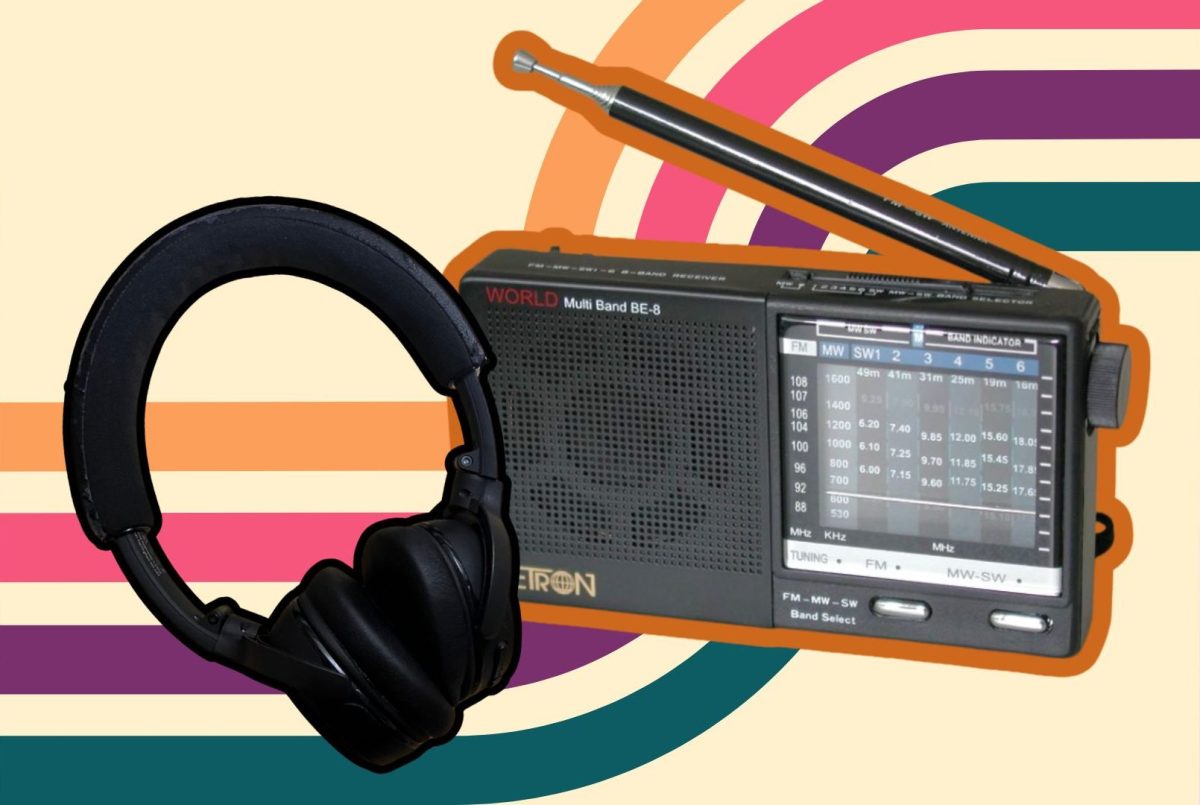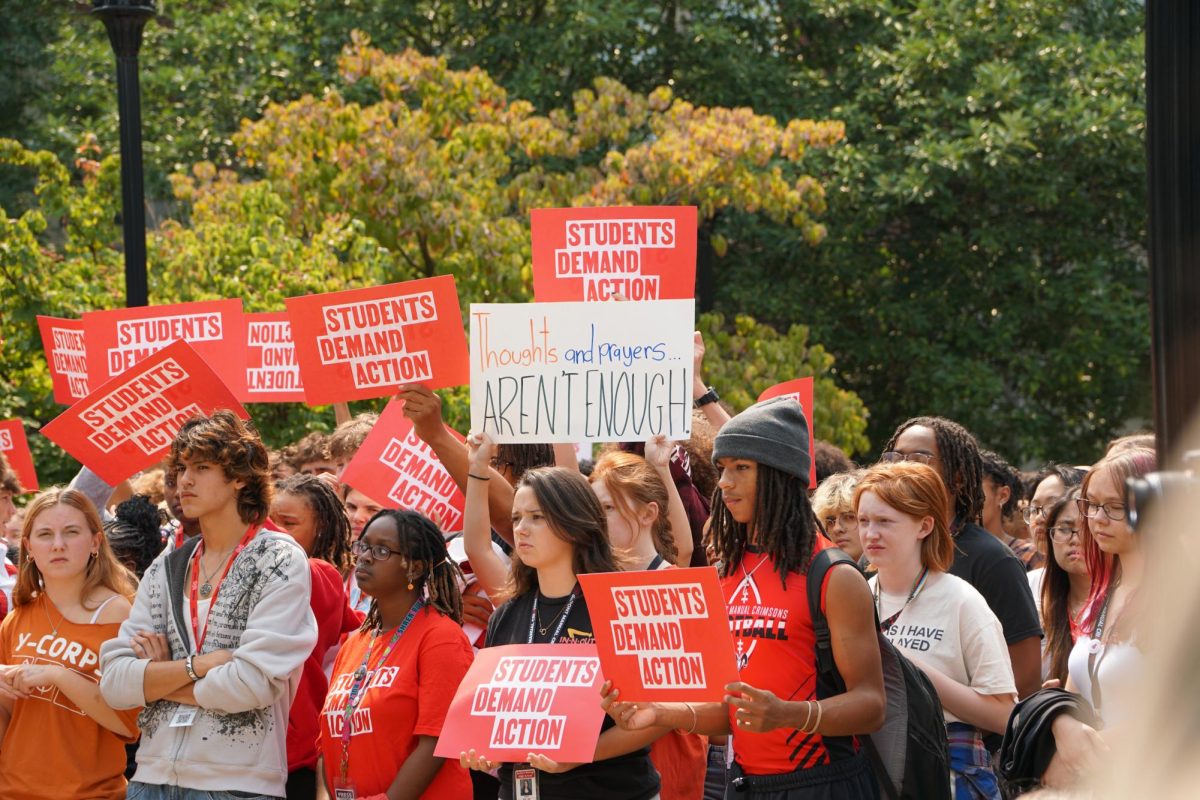The series “We Create the Culture We Want,” named after the mantra, highlights aspects of culture at the high school that impact the community. This first installment explores high caffeine usage among students.
With stressful schedules, blazing alarms and late homework nights, caffeine can be a cushion for high school students to lean back on when they need an extra boost. The stimulant is found in almost every store and restaurant, providing teenagers with a quick and easy way to go from tired to energized within minutes.
Caffeine works by blocking adenosine, a sleep inducing substance, from activating adenosine receptors within the brain, stimulating alertness and increasing energy, according to the American Medical Association.
A survey conducted by The Cypress found that, out of 285 high school student responses, over 28 percent reported drinking a caffeinated beverage one or more times a day on most days.
The survey’s data also revealed that out of the 264 respondents, the majority— 68 percent—had consumed some kind of takeout caffeinated beverage in the last 30 days. Homemade tea or coffee were consumed by 49 percent and 48 percent respectively, and 32 percent reported having caffeinated sodas within the 30 day time frame.
On average, a regular coffee contains anywhere from 113 to 247 milligrams of caffeine, according to the Food and Drug Association, which exceeds the 100 milligram recommended daily maximum caffeine intake for teenagers according to the American Association of Child and Adolescent Psychiatry.
When asked about their caffeine tolerance on a scale of one to five, where five is highest, the median response for students was a four out of five. Of the survey respondents, 54 percent reported most often drinking caffeine during the school day, indicating a link between the high school caffeine culture and actual consumption.
Energy Drinks, All-Nighters and Disordered Eating
Of the 264 question responses, 20 percent of students also reported having consumed a Celsius energy drink in the past 30 days, one of which contains 200 milligrams of caffeine, or double the recommended daily intake.
According to the National Library of Medicine, energy drinks like Celsius have grown in popularity for adolescents in the past 10 years.
The survey also found that about 30 percent of students have consumed energy drinks at least once in the past 30 days.
Nurse Megan Day said she has noticed new trends in the marketing of energy drinks to youth, and how it is in many ways comparable to the marketing of vapes.
“One strategy of many corporations is that their energy drinks have colorful logos and red colors,” Day said. “Monster and Red Bull both have animal imagery and they use tried and true marketing methods to target youth.”
In the survey, 58 percent of respondents selected staying awake as one of the reasons for their caffeine consumption. Sophomore Marcel Masuda Joslyn said that he consumed a lot of energy drinks leading up to stressful testing periods like midterm exam week, especially at times when he needed to sleep less or even pull all-nighters to study.
“I was sleeping maybe between two to six hours a night,” Masuda Joslyn said. “I would be buying energy drinks because in numbers they have more milligrams of caffeine, so I figured if I drink a lot of energy drinks, then that’ll help me stay up more than if I drink the same amount of coffee.”
According to nurse April Armstrong, students come into the clinic a few times a week because of caffeine-related symptoms. Oftentimes students feel the negative side effects of caffeine from its consumption on an empty stomach, Armstrong said.
“I’ve definitely noticed it more over the past couple of years. I don’t know if I just wasn’t here when Red Bull was newer and more popular, but I definitely see a lot, currently, of the Celsius drinks,” Armstrong said.
Day said that it is possible that some students abuse caffeine and develop patterns of caffeine dependency because of struggles with disordered eating.
“It’s definitely something that would cross my mind. It’s a known entity in disordered eating habits or patterns. Nicotine as well as caffeine, suppresses your appetite,” Day said.
Celsius cans have labels that state that the drink “burns body fat” and contains low calories due to the sucralose sweetener used as a replacement for sugar. A student, who wishes to stay anonymous, said that they think others often drink energy drinks like Celsius to replace meals. They said that drinking it makes them, personally, feel good because of its promised fat loss benefits, even though it sometimes gives them heartburn and makes them shaky.
“It fills you up, so if you don’t eat lunch and you get an energy drink, it fills you up for the day,” the student said.
Almost 5 percent of the respondents to the survey selected weight loss as a motivator for their caffeine intake, and a student wrote that drinking caffeine helps suppress their appetite.
Benefits of Caffeine
Caffeine has been consumed by humans for over 10,000 years, according to the American Psychological Association, and has been shown to help with performance in cognitive function. Additionally, caffeine is linked to the enhancement of physical performance and muscular strength, according to the Journal of the International Society of Sports Nutrition.
When posed the question on The Cypress’s survey “Why do you typically choose to drink caffeine?”, over 23 percent of students considered academic performance as one of the contributing factors.
Sophomore and swimmer Zina Shah said that she has noticed a difference in her physical performance at races when she consumes energy drinks.
“Last season I drank a few Celsiuses, and I dropped a second on my 50 free, which is a lot for that event, and it was my season’s best time,” Shah said.
Almost three quarters of responses also mentioned the taste of caffeinated beverages as being a reason. Masuda Joslyn said that besides being a social activity and a way to hang out with friends he doesn’t see often, he enjoys caffeine drinks like Dunkin’ coffees because of their taste.
“I drink coffee mostly because I just like drinking them. I think they taste good. and I just like to have them. But I think I also do use it as a way to help me study because it is helpful to stay up later so I can keep studying and stay focused,” Masuda Joslyn said.
According to junior Fen Carlson, who said they drink coffee almost every day, caffeine allows them to reduce energy boosts. They said they believe it makes them feel calmer and that they have found it can act as a mild version of their ADHD medication.
In the survey results, four students also mentioned their ADHD, but said that it exacerbated their symptoms or did not affect them at all, with only one student writing they used it occasionally to self medicate.
“Personally for me it’s because sometimes people with ADHD experience that caffeine does the reverse of what it typically is supposed to do,” Carlson said. “I’m not sure as to exactly the science why, but for some reason it does that for me.”
Side Effects of Caffeine
Nearly 100 students anonymously wrote about caffeine causing them to experience side effects. Some side effects included panic attacks, feeling jittery, having increased heart rate, shakiness, heart palpitations, sleep issues, nausea, puking, dizziness, sweating and headaches.
Day said she frequently gets visited by students who have consumed caffeine before eating anything. According to Day, she often finds that teenagers are at a higher risk of feeling symptoms because they are likely to skip breakfast and their bodies are still developing.
“I will assess students who have stomach aches, headaches or otherwise feel jittery, dizzy and when I ask them about their food intake or their water intake, it’s usually not a lot of both, but perhaps ‘I’ve had a coffee, I’ve had an energy drink,’ without any sort of offsetting like food or water,” Day said.
Many students also mentioned in the survey that a few hours after drinking caffeine, they begin to feel extremely tired and go through an energy crash. Multiple students also wrote about caffeine making it harder for them to focus.
Although caffeine makes her extremely energetic for short time periods, it wears off quickly, according to Shah, and about an hour after drinking caffeine she often notices that she feels sluggish.
“I feel like if I’m doing a sprint then it does help me go a lot faster, but if I drink something before a practice I’ll get nauseous,” Shah said.
The sugar content in caffeinated drinks can contribute to the crash that many students described feeling after drinking caffeine. According to the Cleveland Clinic, sugar mixed with caffeine gives a quick boost in energy due to the blood sugar spike from sugar content, which can lead to a crash in energy and a feeling of increased tiredness once the caffeine leaves the bloodstream.
Armstrong, who said she sees students come to see her with a racing heart or other caffeine-related symptoms a few times each week, said she has noticed that energy drinks can be high in sugar.
“Some of the energy drinks have a sugary content to them, and some of them don’t; they have more artificial sugars in them,” Armstrong said. “So, that’s a whole different thing. A sugary caffeine drink on an empty stomach can make you feel nauseous.”
Looking Forward
While it may seem that caffeinated beverages are here to stay, Day said that students can still be conscious about when and how much caffeine they choose to consume by incorporating it into a healthy diet.
“I would get used to checking labels, and then also cause and effect, right? Like, ‘Oh, I had a cup of coffee today. I feel pretty good. I had food, I had water,’” Day said. “Maybe the next day you have the same amount, no food, no water, you feel different. So everything’s about testing it out and paying attention to that.”
According to Armstrong, sometimes the body’s usual negative responses to caffeine, such as rebound headaches, can worsen over time when the student does not consume their usual amount of caffeine. She said she hopes students know that her doors are always open if they need to check in or want any advice about how to manage it.
“Be aware that too much caffeine can make you feel anxious. Your body can build a tolerance to caffeine, the more you drink, and then it’s an addictive substance,” Armstrong said. “It’s something that we don’t have an age limit on, so it’s very important for people to pay attention to how much is in their drinks even when they feel fine.”
This story was originally published on The Sagamore on March 12, 2025.






































